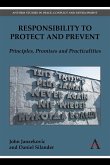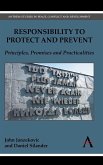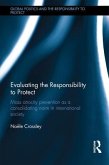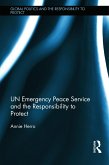The Responsibility to Prevent
Overcoming the Challenges of Atrocity Prevention
Herausgeber: Sharma, Serena K; Welsh, Jennifer M
The Responsibility to Prevent
Overcoming the Challenges of Atrocity Prevention
Herausgeber: Sharma, Serena K; Welsh, Jennifer M
- Gebundenes Buch
- Merkliste
- Auf die Merkliste
- Bewerten Bewerten
- Teilen
- Produkt teilen
- Produkterinnerung
- Produkterinnerung
Filling a critical gap in the literature, this volume draws on, and integrates, the fields of international relations, genocide studies, criminology, and international law to put forward a distinctive view of the 'responsibility to prevent' as crimes prevention.
Andere Kunden interessierten sich auch für
![A Plan to Stop the Present and Prevent Future Wars A Plan to Stop the Present and Prevent Future Wars]() Robert Easley BeasleyA Plan to Stop the Present and Prevent Future Wars31,99 €
Robert Easley BeasleyA Plan to Stop the Present and Prevent Future Wars31,99 €![Internationalization to Prevent the Spread of Nuclear Weapons Internationalization to Prevent the Spread of Nuclear Weapons]() Stockholm International Peace Research IInternationalization to Prevent the Spread of Nuclear Weapons159,99 €
Stockholm International Peace Research IInternationalization to Prevent the Spread of Nuclear Weapons159,99 €![Responsibility to Protect and Prevent Responsibility to Protect and Prevent]() John JanzekovicResponsibility to Protect and Prevent52,99 €
John JanzekovicResponsibility to Protect and Prevent52,99 €![Responsibility to Protect and Prevent Responsibility to Protect and Prevent]() John JanzekovicResponsibility to Protect and Prevent122,99 €
John JanzekovicResponsibility to Protect and Prevent122,99 €![Evaluating the Responsibility to Protect Evaluating the Responsibility to Protect]() Noële CrossleyEvaluating the Responsibility to Protect141,99 €
Noële CrossleyEvaluating the Responsibility to Protect141,99 €![Un Emergency Peace Service and the Responsibility to Protect Un Emergency Peace Service and the Responsibility to Protect]() Annie HerroUn Emergency Peace Service and the Responsibility to Protect148,99 €
Annie HerroUn Emergency Peace Service and the Responsibility to Protect148,99 €![The relations between the Federal Republic of Germany and the Czech Republic. Culture of remembrance to prevent cultural conflicts The relations between the Federal Republic of Germany and the Czech Republic. Culture of remembrance to prevent cultural conflicts]() Daniela Forero NuñezThe relations between the Federal Republic of Germany and the Czech Republic. Culture of remembrance to prevent cultural conflicts27,95 €
Daniela Forero NuñezThe relations between the Federal Republic of Germany and the Czech Republic. Culture of remembrance to prevent cultural conflicts27,95 €-
-
-
Filling a critical gap in the literature, this volume draws on, and integrates, the fields of international relations, genocide studies, criminology, and international law to put forward a distinctive view of the 'responsibility to prevent' as crimes prevention.
Hinweis: Dieser Artikel kann nur an eine deutsche Lieferadresse ausgeliefert werden.
Hinweis: Dieser Artikel kann nur an eine deutsche Lieferadresse ausgeliefert werden.
Produktdetails
- Produktdetails
- Verlag: Hurst & Co.
- Seitenzahl: 474
- Erscheinungstermin: 20. Oktober 2015
- Englisch
- Abmessung: 236mm x 155mm x 33mm
- Gewicht: 862g
- ISBN-13: 9780198717782
- ISBN-10: 0198717784
- Artikelnr.: 47870161
- Herstellerkennzeichnung
- Libri GmbH
- Europaallee 1
- 36244 Bad Hersfeld
- gpsr@libri.de
- Verlag: Hurst & Co.
- Seitenzahl: 474
- Erscheinungstermin: 20. Oktober 2015
- Englisch
- Abmessung: 236mm x 155mm x 33mm
- Gewicht: 862g
- ISBN-13: 9780198717782
- ISBN-10: 0198717784
- Artikelnr.: 47870161
- Herstellerkennzeichnung
- Libri GmbH
- Europaallee 1
- 36244 Bad Hersfeld
- gpsr@libri.de
Dr Serena Sharma is a Lecturer in the Defence Studies Department at King's College. Prior to joining King's Serena was based at the Oxford Institute for Ethics, Law, and Armed Conflict (ELAC) in Oxford University's Department of International Relations. She also held a Lectureship in International Relations at the Queen's College and a Research Fellowship at Wolfson College, Oxford. In 2010 Serena was appointed as the United Nations Association (UK) Special Advisor on the Responsibility to Protect. She holds a PhD in International Relations and a Masters in Human Rights from the London School of Economics and Political Science (LSE). She has served as an editor and associate editor of Millennium: Journal of International Studies. Prior to commencing her graduate studies, Serena worked with the former Canadian Minister of Foreign Affairs, Lloyd Axworthy. Jennifer Welsh is Professor and Chair in International Relations at the European University Institute (Florence, Italy) and a Senior Research Fellow at Somerville College, Oxford. She is co-director of the Oxford Institute for Ethics, Law and Armed Conflict. In July 2013, Professor Welsh was named by UN Secretary Ban ki-moon as his Special Adviser on the Responsibility to Protect. Professor Welsh is the author and editor of several books and articles on the responsibility to protect, humanitarian intervention, the UN Security Council, and the principle of sovereignty. She sits on the editorial boards of the journals Ethics and International Affairs and Global Responsibility to Protect, and the Cambridge University Press series in International Relations. From 2014, she will be directing a 5-year research project, funded by the European Research Council, on the 'individualization of war'.
* Introduction
* Part I: Concepts and Capacities
* 1: Ruben Reike, Serena K. Sharma and Jennifer M. Welsh:
Conceptualizing the Responsibility to Prevent
* 2: Ekkehard Strauss: Institutional Capacities of the United Nations
to Prevent and Halt Atrocity Crimes
* 3: Monica Serrano: National Focal Points for R2P: Institutionalizing
the Responsibility to Prevent
* Part II: Targeted Preventive Tools
* 4: Jennifer M. Welsh: Mediation and Sanctions: Applying Conflict
Prevention Tools in Atrocity Crime Settings
* 5: Dan Saxon: The International Criminal Court and the Prevention of
Crimes
* 6: Sarah Sewall: Military Options for Preventing Atrocity Crimes
* 7: Jonathan Leader Maynard: Combating Atrocity-Justifying Ideologies
* Part III: Case Studies
* 8: Abiodun Williams: The Possibilities for Preventive Deployment: The
Case of Macedonia
* 9: Walter Lotze and Alexandra Martins: The Responsibility to Prevent
Atrocity Crimes: Drawing Lessons from International Intervention in
Burundi
* 10: Serena K. Sharma: The 2007-08 Post-Election Crisis in Kenya: A
Case of Escalation Prevention
* 11: Naomi Kikoler: Guinea: An Overlooked Case of the Responsibility
to Prevent in Practice
* 12: Ruben Reike: Libya and the Prevention of Mass Atrocity Crimes: A
Controversial Success
* Conclusion: An Integrated Framework for Atrocity Prevention
* Part I: Concepts and Capacities
* 1: Ruben Reike, Serena K. Sharma and Jennifer M. Welsh:
Conceptualizing the Responsibility to Prevent
* 2: Ekkehard Strauss: Institutional Capacities of the United Nations
to Prevent and Halt Atrocity Crimes
* 3: Monica Serrano: National Focal Points for R2P: Institutionalizing
the Responsibility to Prevent
* Part II: Targeted Preventive Tools
* 4: Jennifer M. Welsh: Mediation and Sanctions: Applying Conflict
Prevention Tools in Atrocity Crime Settings
* 5: Dan Saxon: The International Criminal Court and the Prevention of
Crimes
* 6: Sarah Sewall: Military Options for Preventing Atrocity Crimes
* 7: Jonathan Leader Maynard: Combating Atrocity-Justifying Ideologies
* Part III: Case Studies
* 8: Abiodun Williams: The Possibilities for Preventive Deployment: The
Case of Macedonia
* 9: Walter Lotze and Alexandra Martins: The Responsibility to Prevent
Atrocity Crimes: Drawing Lessons from International Intervention in
Burundi
* 10: Serena K. Sharma: The 2007-08 Post-Election Crisis in Kenya: A
Case of Escalation Prevention
* 11: Naomi Kikoler: Guinea: An Overlooked Case of the Responsibility
to Prevent in Practice
* 12: Ruben Reike: Libya and the Prevention of Mass Atrocity Crimes: A
Controversial Success
* Conclusion: An Integrated Framework for Atrocity Prevention
* Introduction
* Part I: Concepts and Capacities
* 1: Ruben Reike, Serena K. Sharma and Jennifer M. Welsh:
Conceptualizing the Responsibility to Prevent
* 2: Ekkehard Strauss: Institutional Capacities of the United Nations
to Prevent and Halt Atrocity Crimes
* 3: Monica Serrano: National Focal Points for R2P: Institutionalizing
the Responsibility to Prevent
* Part II: Targeted Preventive Tools
* 4: Jennifer M. Welsh: Mediation and Sanctions: Applying Conflict
Prevention Tools in Atrocity Crime Settings
* 5: Dan Saxon: The International Criminal Court and the Prevention of
Crimes
* 6: Sarah Sewall: Military Options for Preventing Atrocity Crimes
* 7: Jonathan Leader Maynard: Combating Atrocity-Justifying Ideologies
* Part III: Case Studies
* 8: Abiodun Williams: The Possibilities for Preventive Deployment: The
Case of Macedonia
* 9: Walter Lotze and Alexandra Martins: The Responsibility to Prevent
Atrocity Crimes: Drawing Lessons from International Intervention in
Burundi
* 10: Serena K. Sharma: The 2007-08 Post-Election Crisis in Kenya: A
Case of Escalation Prevention
* 11: Naomi Kikoler: Guinea: An Overlooked Case of the Responsibility
to Prevent in Practice
* 12: Ruben Reike: Libya and the Prevention of Mass Atrocity Crimes: A
Controversial Success
* Conclusion: An Integrated Framework for Atrocity Prevention
* Part I: Concepts and Capacities
* 1: Ruben Reike, Serena K. Sharma and Jennifer M. Welsh:
Conceptualizing the Responsibility to Prevent
* 2: Ekkehard Strauss: Institutional Capacities of the United Nations
to Prevent and Halt Atrocity Crimes
* 3: Monica Serrano: National Focal Points for R2P: Institutionalizing
the Responsibility to Prevent
* Part II: Targeted Preventive Tools
* 4: Jennifer M. Welsh: Mediation and Sanctions: Applying Conflict
Prevention Tools in Atrocity Crime Settings
* 5: Dan Saxon: The International Criminal Court and the Prevention of
Crimes
* 6: Sarah Sewall: Military Options for Preventing Atrocity Crimes
* 7: Jonathan Leader Maynard: Combating Atrocity-Justifying Ideologies
* Part III: Case Studies
* 8: Abiodun Williams: The Possibilities for Preventive Deployment: The
Case of Macedonia
* 9: Walter Lotze and Alexandra Martins: The Responsibility to Prevent
Atrocity Crimes: Drawing Lessons from International Intervention in
Burundi
* 10: Serena K. Sharma: The 2007-08 Post-Election Crisis in Kenya: A
Case of Escalation Prevention
* 11: Naomi Kikoler: Guinea: An Overlooked Case of the Responsibility
to Prevent in Practice
* 12: Ruben Reike: Libya and the Prevention of Mass Atrocity Crimes: A
Controversial Success
* Conclusion: An Integrated Framework for Atrocity Prevention








